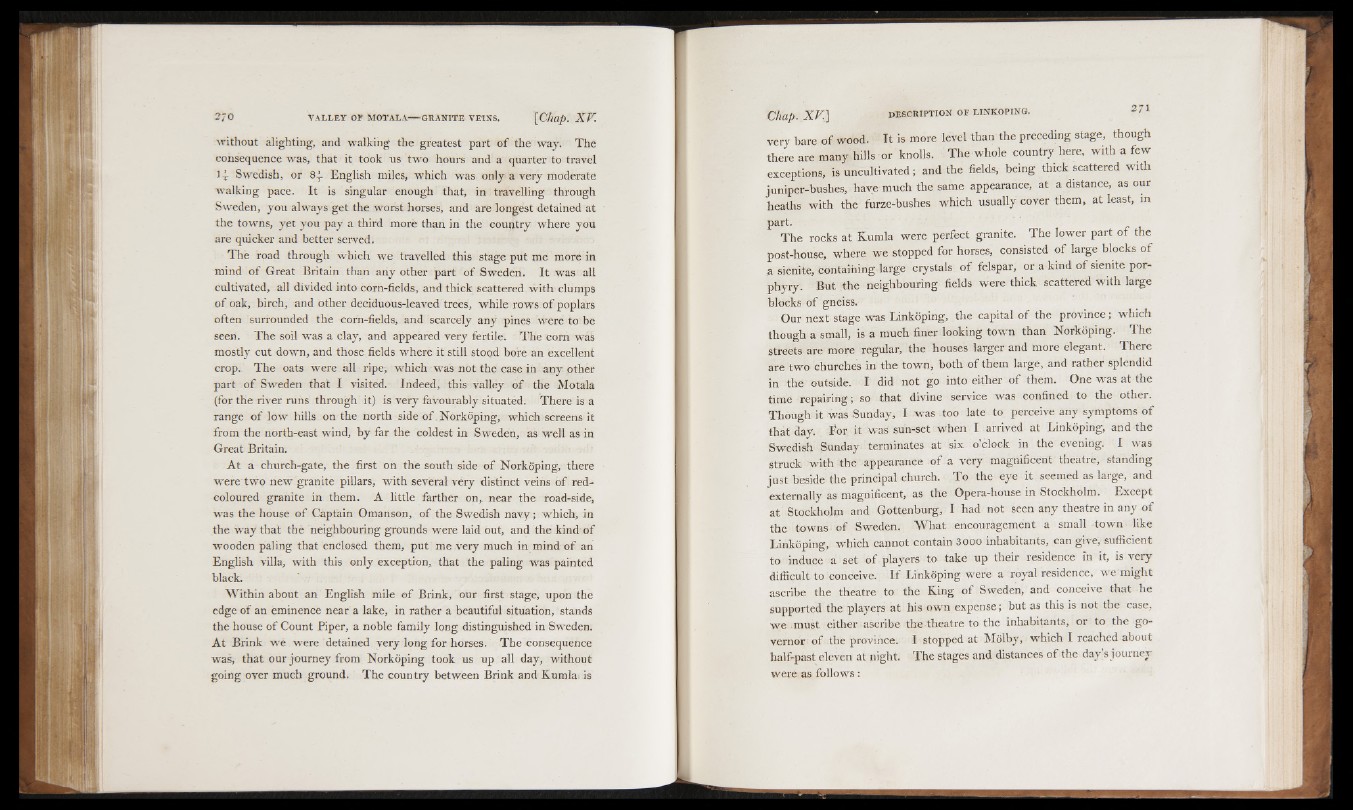
without alighting, and walking the greatest part o f the way. The
consequence was, that it took us two hours and a quarter to travel
I ^ Swedish, or 8 English miles, which was only a very moderate
walking pace. I t is singular enough that, in travelling through
Sweden, you always get the worst horses, and are longest detained at
the towns, yet you pay a third more than in the country where you
are quicker and better served.
T he road through which we travelled this stage put me more in
mind o f Great Britain than any other part o f Sweden. I t was all
cultivated, all divided into corn-fields, and thick scattered with clumps
o f oak, birch, and other deciduous-leaved trees, while rows o f poplars
often surrounded the corn-fields, and scarcely any pines were to be
seen. The soil was a clay, and appeared very fertile. T h e com was
mostly cut down, and those fields where it still stood bore an excellent
crop. The oats were all ripe, which was not the case in any. other
part o f Sweden that I visited. Indeed, this valley o f the Motala
(for the river runs through it) is very favourably situated. There is a
range o f low hills on the north side o f , Norkoping, which screens it
from the north-east wind, by far the coldest in Sweden, as well as in
Great Britain.
A t a church-gate, the first on the south side o f Norkoping, there
were two new granite pillars, with several very distinct veins o f red-
coloured granite in them. A little farther on, near the road-side,
was the house o f Captain Omanson, o f the Swedish navy; which, in
the way that the neighbouring grounds were laid out, and the kind o f
wooden paling that enclosed them, put me very much in mind o f an
English villa, with this only exception, that the paling was painted
black.
Within about an English mile o f Brink, our first stage, upon the
edge of an eminence near a lake, in rather a beautiful situation, stands
the house of Count Piper, a noble family long distinguished in Sweden.
A t Brink we were detained very long for horses. The consequence
was, that our journey from Norkoping took us up all day, without
going over much ground. The country between Brink and Kumla. is
very bare o f wood. I t is more level than the preceding stage, though
there are many hills or knolls. The whole country here, with a few
exceptions, is uncultivated ; and the fields, being thick scattered with
juniper-bushes, have much the same appearance, at a distance, as our
heaths with the furze-bushes which usually cover them, at least, in
part.
T he rocks at Kumla were perfect granite. The lower part o f the
post-house, where we stopped for horses, consisted o f large blocks o f
a sienite, containing large crystals o f felspar, or a kind o f sienite porphyry.
But the neighbouring fields were thick scattered with large
blocks o f gneiss.
Our next stage was Linköping, the capital o f the province ; which
though a small, is a much finer looking town than Norkoping. The
streets are more regular, the houses larger and more elegant. There
are two churches in the town, both o f them large, and rather splendid
in the outside. I did not go into either o f them. One was at the
time repairing ; so that divine service was confined to the other.
Though it was Sunday, I was too late to perceive any symptoms o f
that day. Tor it was sun-set when I arrived at Linköping, and the
Swedish Sunday terminates at six o’clock in the evening. I was
struck with the appearance o f a very magnificent theatre, standing
just beside the principal church. T o the eye it seemed as large, and
externally as magnificent, as the Opera-house in Stockholm. Except
at Stockholm and Gottenburg, I had not seen any theatre in any o f
the towns o f Sweden. W h at encouragement a small town like
Linköping, which cannot contain 3000 inhabitants, can give, sufficient
to induce a set o f players to- take up their residence in it, is very
difficult to conceive. I f Linköping were a royal residence, we might
ascribe the theatre to the King o f Sweden, and conceive that he
supported the players at his own expense; but as this is not the case,
we must either : ascribe the theatre to the inhabitants, or to the governor
o f thé province. I stopped at Môlby, which I reached about
half-past eleven at night. The stages and distances o f the day’s journey
were as follows :